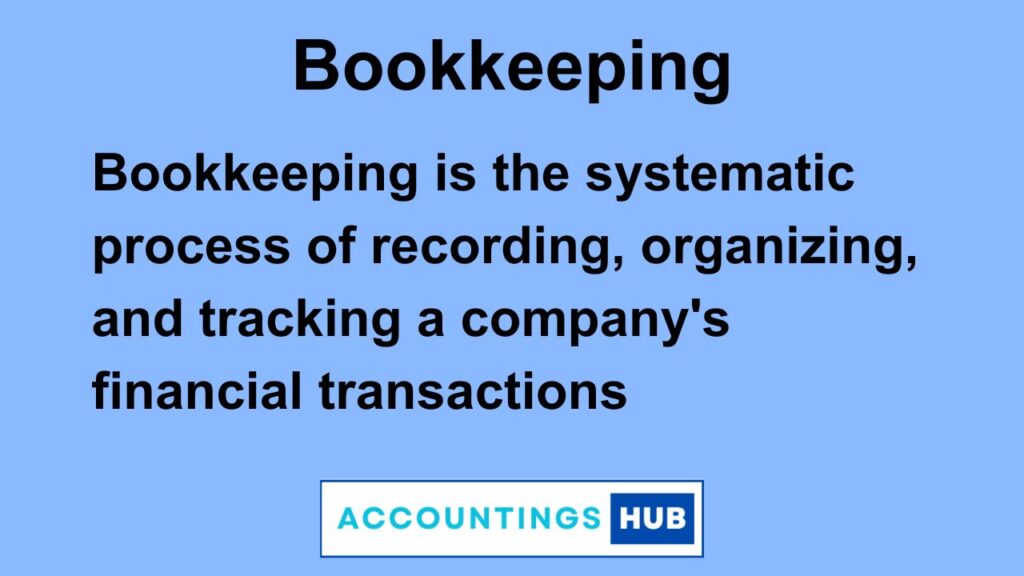Bookkeeping is the backbone of any successful business. it is the systematic process of recording, organizing, and tracking a company’s financial transactions. In this article, we’ll explore the ins and outs of bookkeeping, why it’s essential, and how to get started on the right foot.

Understanding Bookkeeping
Bookkeeping is often seen as a mundane task, but it’s far from it. Here’s why it’s a cornerstone of business success:
- Financial Clarity: Good bookkeeping provides a clear picture of your business’s financial performance, allowing you to make informed decisions.
- Tax Compliance: Accurate records ensure that you’re paying the right amount of taxes and can provide evidence during tax audits.
- Budget Management: Tracking expenses helps you manage your budget effectively, ensuring you don’t overspend.
- Investor and Lender Confidence: Transparent financial records instill trust in potential investors and lenders, making it easier to secure funding when needed.
Starting with the Basics
Now let’s delve into the basics:
- Choose the Right System: Decide whether you’ll use single-entry or double-entry bookkeeping. Double-entry is more complex but offers greater accuracy.
- Separate Business and Personal Finances: Open a separate business bank account and credit card to avoid mingling personal and business expenses.
- Keep Receipts and Invoices: Maintain copies of all financial documents, including invoices, receipts, bank statements, and tax records. These serve as evidence for your it entries.
- Consistency is Key: Make a habit of updating your books regularly. Set aside time weekly or monthly to enter transactions and reconcile accounts.
Selecting Bookkeeping Software
Here are some popular options:
- QuickBooks: A widely used accounting software suitable for businesses of all sizes.
- Xero: Ideal for small businesses, Xero offers easy-to-use features and cloud-based accessibility.
- FreshBooks: Great for freelancers and service-based businesses, FreshBooks simplifies invoicing and expense tracking.
- Wave: A free option with basic bookkeeping features, making it suitable for startups and sole proprietors.
Seek Professional Help
While some business owners manage their bookkeeping, it’s advisable to consider professional assistance for complex financial matters. A certified bookkeeper or accountant can help you navigate tax regulations and ensure compliance.
Conclusion
In summary, bookkeeping is the lifeblood of any business. By maintaining accurate records, you gain financial clarity, ensure tax compliance, and build trust with potential investors and lenders. Whether you choose to handle bookkeeping in-house or hire a professional, understanding the basics is essential for your business’s success. Don’t underestimate the power of organized finances; it can make the difference between thriving and struggling in the competitive business world. If you’re unsure about where to start, consult with a qualified bookkeeper or accountant to set your business on the right financial path.
Frequently Asked Questions
What is Bookkeeping?
Bookkeeping is the systematic process of recording, organizing, and tracking a company’s financial transactions. This includes income, expenses, assets, liabilities, and equity. The primary goal is to maintain accurate financial records, aiding in decision-making, and tax compliance.
What Are the Basics of Bookkeeping?
Two fundamental methods:
- Single-Entry: Simple and suitable for small businesses. Records income and expenses as they occur.
- Double-Entry: More complex but accurate. Every transaction has two entries – a debit and a credit – ensuring the books always balance.
What Software Can I Use for Bookkeeping?
There are numerous software options available, such as QuickBooks, Xero, and FreshBooks. Choose one that suits your business size, needs, and budget.
Why is Bookkeeping Important?
There are several reasons:
- Financial Decision-Making
- Tax Compliance
- Financial Stability
- Investor and Lender Confidence
